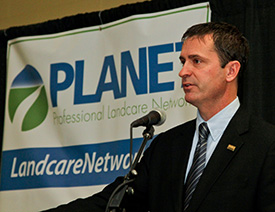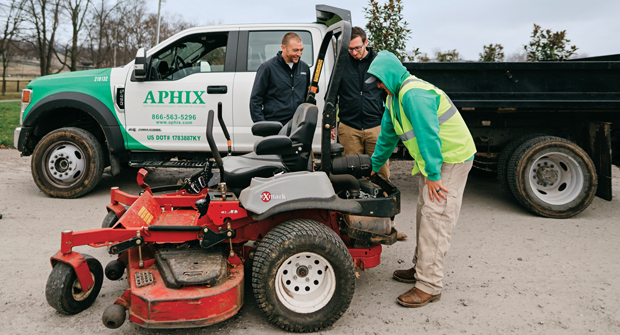No. 113
Lawn Dawg
Nashua, N.H.

Seventeen years ago, Jim Campanella was ready to branch out on his own after working for various lawn care companies in New England. In late 1996, TruGreen acquired Barefoot Grass, where he was the New England regional manager. The company offered him a job in Portland, Maine, but that wasn’t where he wanted to be, so in 1997 he started Lawn Dawg with a pickup truck and a telephone book.
Today, his company has 11 locations throughout the Northeast. It grew nearly 14 percent in 2013 over 2012, despite facing challenges due to the Affordable Care Act (it lost its health care plan), staffing shortages and legislative activity threatening use of neonicotinoids and limiting fertilizer inputs.
Thirty-one years ago when I first started in the industry, I’d get in a 600-gallon spray-tank truck and go down the street to spray lawns. People would be flagging us down saying, ‘Please spray our lawns.’ It was easy. We’d have thousands of leads in a couple days.
Back then, there were no other regulations than to have a license to spray pesticides. You didn’t have to leave a flag or notify neighbors.
The industry got so big so fast, it piqued the interest of the activist community, the self-proclaimed environmentalists. Before we knew it, we stared seeing legislative activity.
Organizing ourselves better and positioning ourselves as true environmentalists may have prevented much of the negative publicity and legislation we face today. We ignored the activist attacks on our industry thinking it would go away, largely because we were in such high demand.
The Professional Lawn Care Association of America (PLCAA) was formed (in 1979) with the intent to help fight some of these attacks we were under, but we weren’t well organized yet. We stood by our guns and said the products were scientifically tested and we’re not hurting anybody. Meanwhile, our opponents were attacking us using emotion. You can’t fight emotion with science. It doesn’t matter how much you’re speaking the truth,
emotion trumps science every time.
We should have done a better job positioning ourselves as providing cleaner air, cleaner groundwater and cooling effects through healthy turf.
The biggest compromise we made was the sign postings. We said, ‘If that’s the worst that’s going to happen, we can live with it.’ Today, that’s still the No. 1 thing we hear, ‘If what you’re spraying is OK, why do you have to put up the signs?’
I think we’re better organized today, but I still don’t think we communicate to the general public as much as we should.
In 2010 there was legislation introduced in New Hampshire to ban all aesthetic use of pesticides, similar to what they have in Canada. We did a good job of defeating that bill because we had the science to prove everything was safe to use from chemical manufacturers and Responsible Industry for a Sound Environment (RISE). That allowed me as the local guy to appeal with the emotional argument. I could talk about my 25,000 customers that rely on me to manage their green spaces. It was a great team effort and we defeated that bill soundly.
The average operator who gets in this situation should call the Professional Landcare Network (PLANET) right away. We can’t watch everything because we’re out there working every day, but we have an obligation to support the associations that stay in tune as the watchdogs for us. Too many people rely on them but aren’t members and don’t pay dues. If you’re in a state with a state or regional association that can represent you, you have an obligation to be a member.
The other thing is to make sure your legislators know who you are, especially if they’re your customers. Communicate with them. Make sure they know that if something comes up about lawn care, they can contact you as an expert.”

